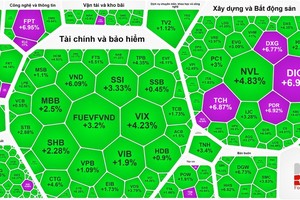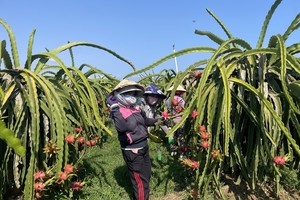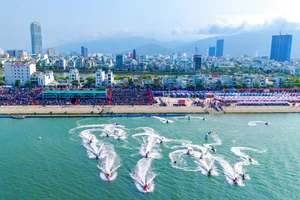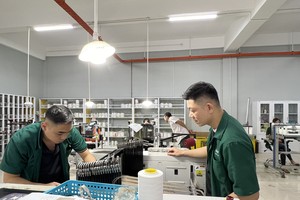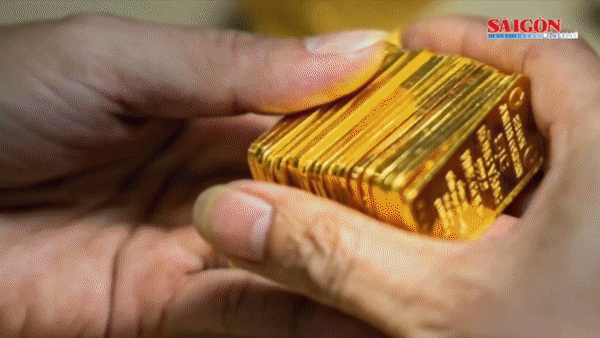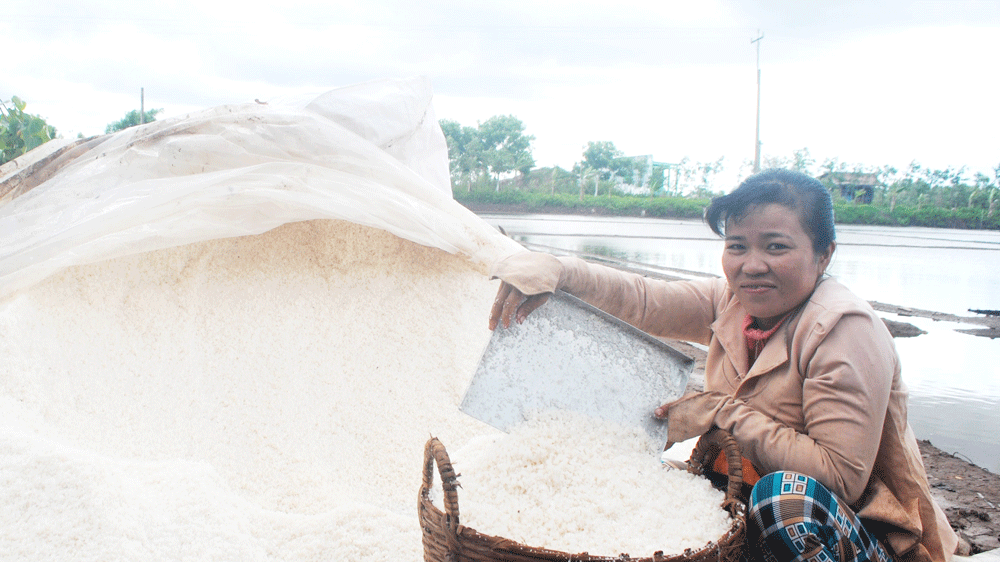
Low selling price
Bac Lieu Province has two districts engaged in the salt farming industry, namely Dong Hai and Hoa Binh. Ben Tre has Ba Tri District with more than 1,020 hereditary salt-farming households in four communes, consisting of Bao Thuan, Bao Thanh, Tan Thuy, and An Thuy, with a total area of 850 hectares. The salt farming area in Bao Thuan and Bao Thanh communes alone accounts for 600 hectares. These are also the two communes recognized by Ben Tre Province as salt making villages.
Mr. Tran Van To, a farmer in Bao Thanh Commune, said that his family has been following the salt-making industry for a long time. The initial cost for his 6,000 square meters of salt evaporation ponds is a few million Vietnamese dongs. However, the price of salt at the end of the crop is merely at VND25,000-VND28,000 per bushel that is not enough to make up for the cost for hiring workers to carry salt from the ponds to the shore which costs VND6,000 per bushel. Thanks to severe hot weather, the salt crop was prolonged for a month so his family’s salt production reached around 1,000 bushels, up 15 percent compared to the same period last year.
Trying to harvest the remaining amount of salt in the pond, Ms. Le Thi Thuy, a farmer in Bao Thanh Commune, said that the salt crop ends at the end of the fourth month in the lunar calendar (around June 20 this year). This year, the salt crop is longer than usual. A few months later, farmers will improve the ponds and repair the edge of the ponds then they will raise shrimps, crabs, and pseudapocryptes elongates fish. That is the cultivation cycle by the natural law of farmers in Ba Tri District.
‘The current price of salt is too low so I will possibly hold my salt and wait until the ninth month in the lunar calendar (the beginning month of the flood season in the Mekong Delta that is from October 17 this year) when the demand for salt increases to sell. Because during the flood season in the Mekong Delta, there will be more fish, the demand for salt for the production of fish sauce will increase, helping the price of salt to climb higher. Last year, the price of salt fluctuated from VND45,000 to VND60,000 per bushel,’ said Ms. Thuy.
According to Mr. Mai Van Tri, an official of the Department of Agriculture and Rural Development of Ba Tri District, this year, the salinity level is high. On average, seawater with salinity from 15 per mille can be used to make salt while the crystalized salt has a salinity of 23-24 per mille. However, the unusually hot weather caused the salinity level to be higher this year, the salt production increased by 57,500 tons, up 30 percent over the same period last year. Besides, due to low selling prices, some households have still been keeping their salt so salt inventory is around 46,000 tons.
Improving the quality of salt
In Bac Lieu Province, thanks to favorable for salt making, prolonged hot weather in the past months has helped to shorten the time for the salt to crystalize. The quality and production of salt are higher than in previous years. It is estimated that, on average, a 100-square-meter of plastic-lined pond produces 7 tons of salt per hectare per annum. Currently, the price of traditionally-farmed salt is at VND500-VND900 per kilogram while salt farmed on plastic-lined ponds fetches VND700-VND1,500 per kilogram, depending on each kind. Mr. Tran Thanh Quang, a farmer in Dien Hai Commune in Dong Hai District in Bac Lieu Province, said that severe hot weather has shortened the time of crystallization of salt, resulting in high productivity. Besides, the prices of salt are fairly high so it is estimated that farmers will earn a profit of nearly VND50 million per hectare in this crop.
Mr. Nguyen Hoang Quoc, Chairman of the Huy Dien Salt Cooperative, said that for nearly a decade, the life of salt farmers in the cooperative has not improved. The cooperative has 31 members, making salt on an area of 20 hectares. So far, the salt production has been around 7,000 bushels of salt. This is the highest productivity ever. However, due to the lack of investment capital, the cooperative produces salt traditionally and sells its salt at VND600 per kilogram. With this price level, after deducting costs, salt farmers almost earn no profits.
He added that the current salt-farming area of Bac Lieu Province is 1,548 hectares, of which plastic-lined ponds account for 69 hectares. The salt yield was 65,191 tons, of which salt collected from plastic-lined ponds accounted for 6,334 tons, reaching 123 percent of the plan.
Due to the natural condition of Ben Tre Province that the seawater is rich with alluvium, salt contains lots of impurities, so the price is not high and the consumption market has not been connected. Salt is mainly consumed domestically for making ice and fish sauce. Therefore, the Department of Agriculture and Rural Development of Ba Tri District has implemented the model of plastic-lined salt farming that shortens the time of crystallization and gives better quality of salt. Although the investment cost is not high, it has not been multiplied by farmers. Recently, having recognized the effectiveness of the model, farmers have converted 75 hectares of salt farming area, the output accordingly has increased by 1-2 percent.
Mr. Mai Van Tri said that the Department of Agriculture and Rural Development of Ba Tri District will soon collaborate with the Department of Rural Development of Ben Tre Province to invite some enterprises to provide technical training for salt farmers to improve the quality of salt, aiming at enterprises to offtake clean salt production for farmers. Up to now, the four salt-making communes have established the Bao Thanh cooperative group. Officers from the Department of Agriculture and Rural Development also regularly meet and train salt-making techniques for farmers to help the development of the salt industry in Ba Tri District.
Bac Lieu Province has two districts engaged in the salt farming industry, namely Dong Hai and Hoa Binh. Ben Tre has Ba Tri District with more than 1,020 hereditary salt-farming households in four communes, consisting of Bao Thuan, Bao Thanh, Tan Thuy, and An Thuy, with a total area of 850 hectares. The salt farming area in Bao Thuan and Bao Thanh communes alone accounts for 600 hectares. These are also the two communes recognized by Ben Tre Province as salt making villages.
Mr. Tran Van To, a farmer in Bao Thanh Commune, said that his family has been following the salt-making industry for a long time. The initial cost for his 6,000 square meters of salt evaporation ponds is a few million Vietnamese dongs. However, the price of salt at the end of the crop is merely at VND25,000-VND28,000 per bushel that is not enough to make up for the cost for hiring workers to carry salt from the ponds to the shore which costs VND6,000 per bushel. Thanks to severe hot weather, the salt crop was prolonged for a month so his family’s salt production reached around 1,000 bushels, up 15 percent compared to the same period last year.
Trying to harvest the remaining amount of salt in the pond, Ms. Le Thi Thuy, a farmer in Bao Thanh Commune, said that the salt crop ends at the end of the fourth month in the lunar calendar (around June 20 this year). This year, the salt crop is longer than usual. A few months later, farmers will improve the ponds and repair the edge of the ponds then they will raise shrimps, crabs, and pseudapocryptes elongates fish. That is the cultivation cycle by the natural law of farmers in Ba Tri District.
‘The current price of salt is too low so I will possibly hold my salt and wait until the ninth month in the lunar calendar (the beginning month of the flood season in the Mekong Delta that is from October 17 this year) when the demand for salt increases to sell. Because during the flood season in the Mekong Delta, there will be more fish, the demand for salt for the production of fish sauce will increase, helping the price of salt to climb higher. Last year, the price of salt fluctuated from VND45,000 to VND60,000 per bushel,’ said Ms. Thuy.
According to Mr. Mai Van Tri, an official of the Department of Agriculture and Rural Development of Ba Tri District, this year, the salinity level is high. On average, seawater with salinity from 15 per mille can be used to make salt while the crystalized salt has a salinity of 23-24 per mille. However, the unusually hot weather caused the salinity level to be higher this year, the salt production increased by 57,500 tons, up 30 percent over the same period last year. Besides, due to low selling prices, some households have still been keeping their salt so salt inventory is around 46,000 tons.
Improving the quality of salt
In Bac Lieu Province, thanks to favorable for salt making, prolonged hot weather in the past months has helped to shorten the time for the salt to crystalize. The quality and production of salt are higher than in previous years. It is estimated that, on average, a 100-square-meter of plastic-lined pond produces 7 tons of salt per hectare per annum. Currently, the price of traditionally-farmed salt is at VND500-VND900 per kilogram while salt farmed on plastic-lined ponds fetches VND700-VND1,500 per kilogram, depending on each kind. Mr. Tran Thanh Quang, a farmer in Dien Hai Commune in Dong Hai District in Bac Lieu Province, said that severe hot weather has shortened the time of crystallization of salt, resulting in high productivity. Besides, the prices of salt are fairly high so it is estimated that farmers will earn a profit of nearly VND50 million per hectare in this crop.
Mr. Nguyen Hoang Quoc, Chairman of the Huy Dien Salt Cooperative, said that for nearly a decade, the life of salt farmers in the cooperative has not improved. The cooperative has 31 members, making salt on an area of 20 hectares. So far, the salt production has been around 7,000 bushels of salt. This is the highest productivity ever. However, due to the lack of investment capital, the cooperative produces salt traditionally and sells its salt at VND600 per kilogram. With this price level, after deducting costs, salt farmers almost earn no profits.
He added that the current salt-farming area of Bac Lieu Province is 1,548 hectares, of which plastic-lined ponds account for 69 hectares. The salt yield was 65,191 tons, of which salt collected from plastic-lined ponds accounted for 6,334 tons, reaching 123 percent of the plan.
Due to the natural condition of Ben Tre Province that the seawater is rich with alluvium, salt contains lots of impurities, so the price is not high and the consumption market has not been connected. Salt is mainly consumed domestically for making ice and fish sauce. Therefore, the Department of Agriculture and Rural Development of Ba Tri District has implemented the model of plastic-lined salt farming that shortens the time of crystallization and gives better quality of salt. Although the investment cost is not high, it has not been multiplied by farmers. Recently, having recognized the effectiveness of the model, farmers have converted 75 hectares of salt farming area, the output accordingly has increased by 1-2 percent.
Mr. Mai Van Tri said that the Department of Agriculture and Rural Development of Ba Tri District will soon collaborate with the Department of Rural Development of Ben Tre Province to invite some enterprises to provide technical training for salt farmers to improve the quality of salt, aiming at enterprises to offtake clean salt production for farmers. Up to now, the four salt-making communes have established the Bao Thanh cooperative group. Officers from the Department of Agriculture and Rural Development also regularly meet and train salt-making techniques for farmers to help the development of the salt industry in Ba Tri District.

